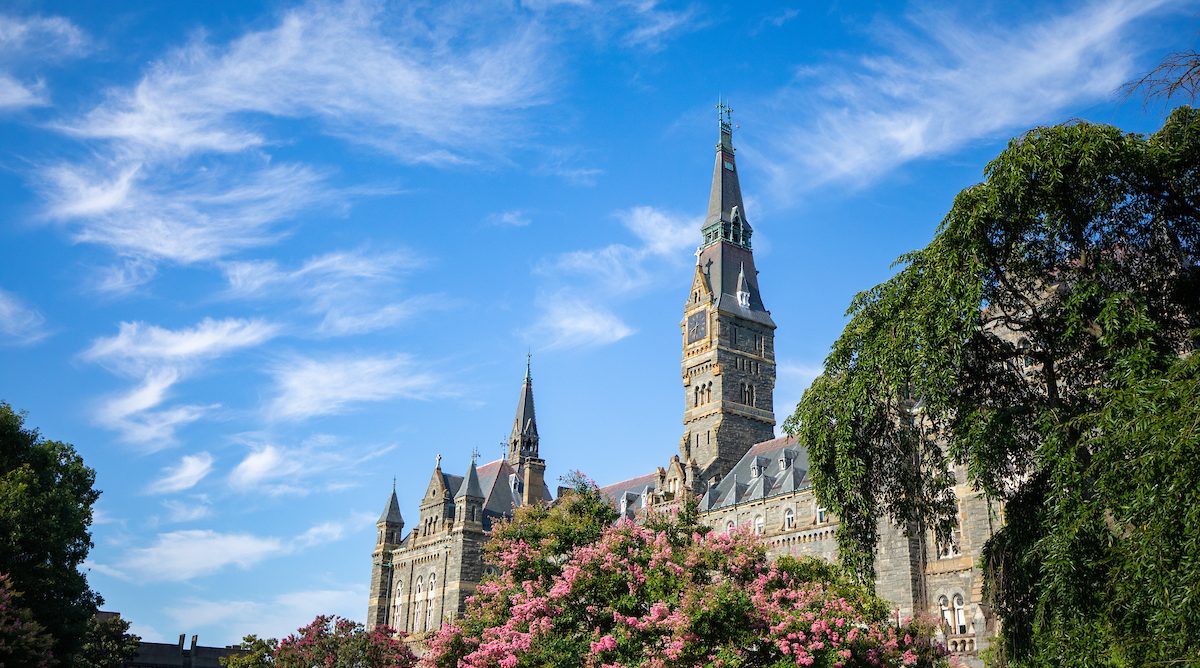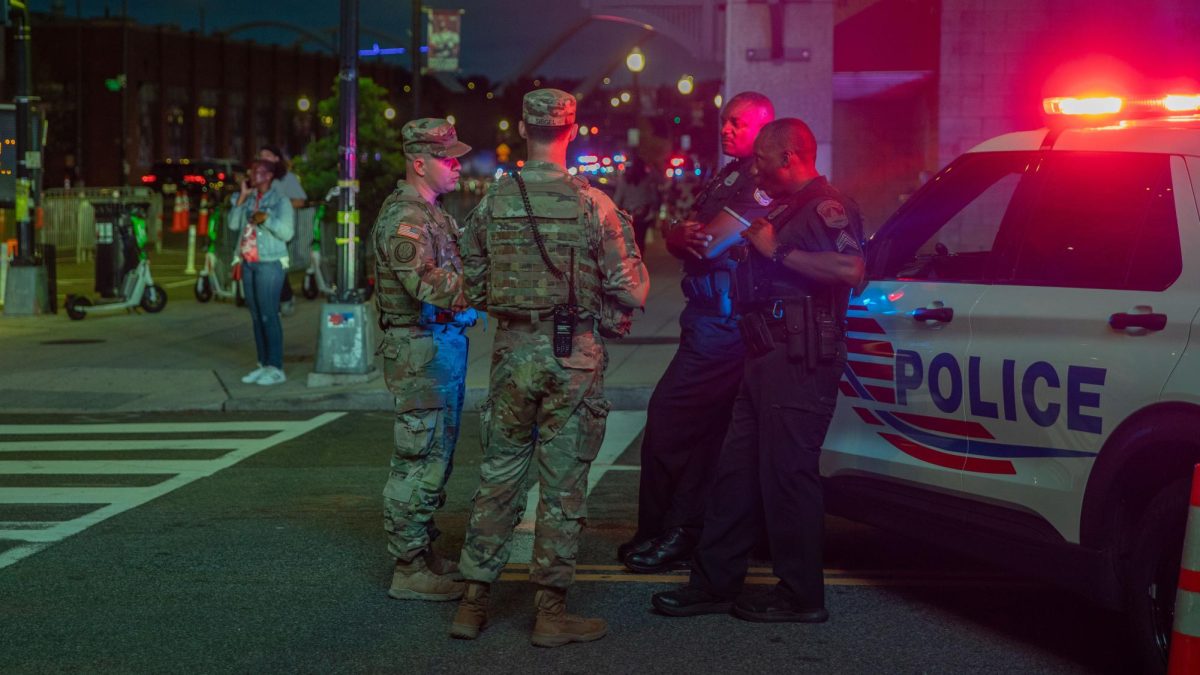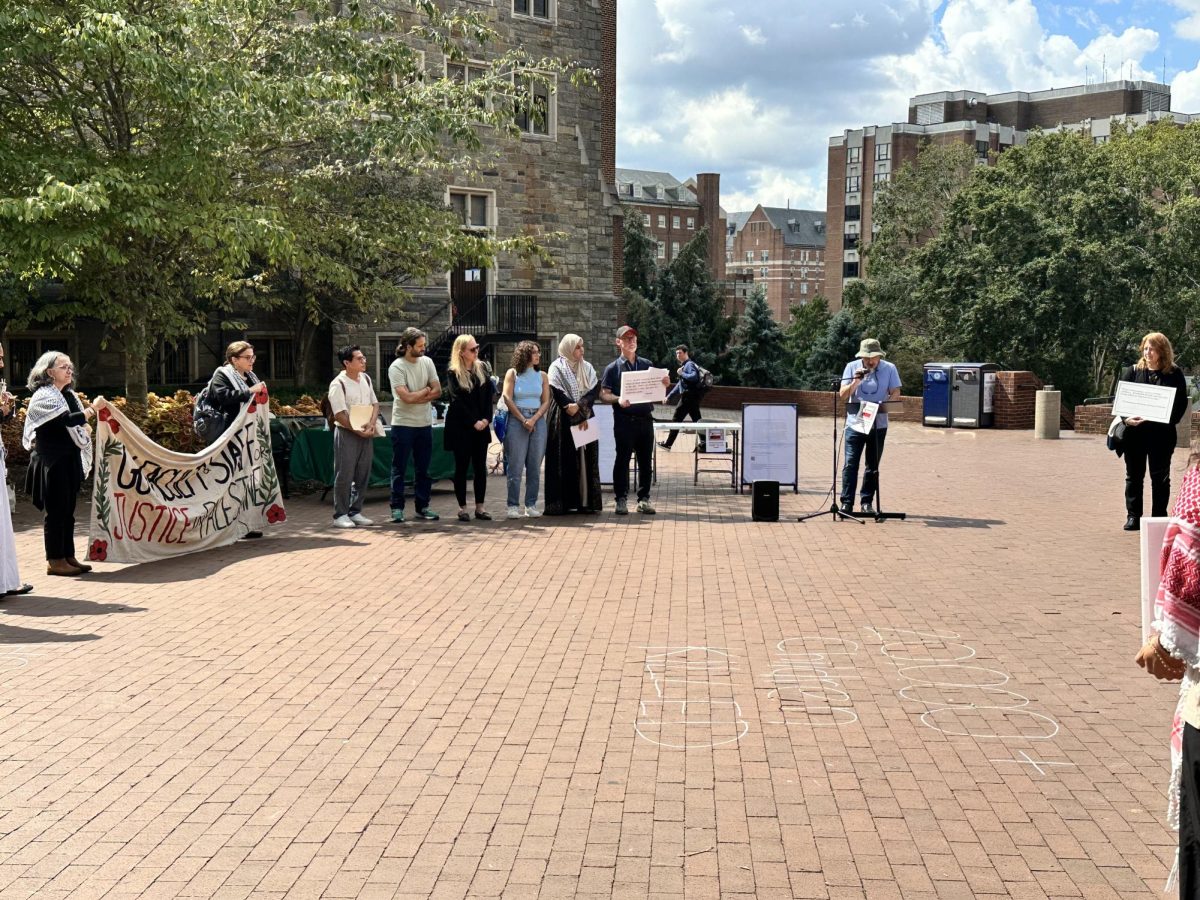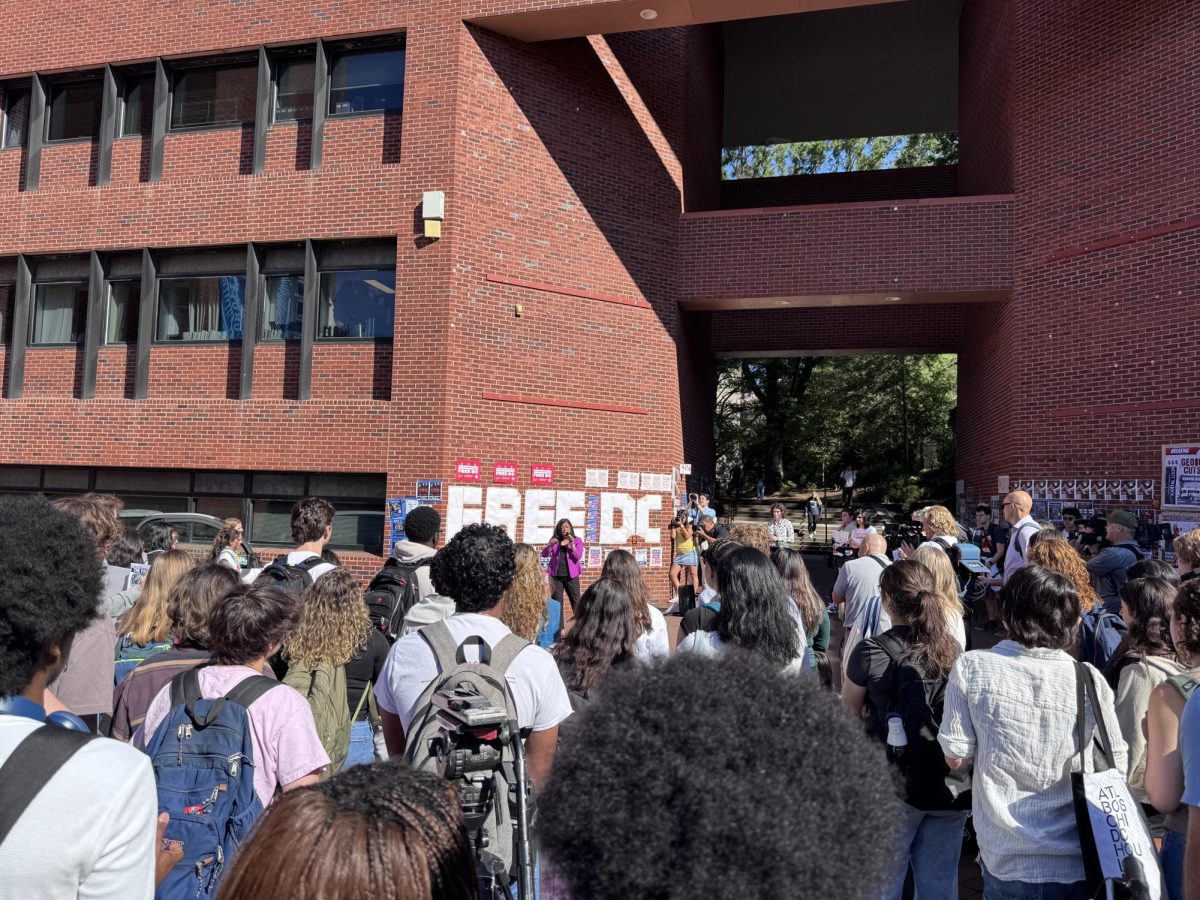A federal judge remained skeptical of arguments that detained Georgetown University postdoctoral researcher Badar Khan Suri’s case should move to Texas after lawyers sparred over jurisdiction at a May 1 hearing in Alexandria, Va.
U.S. Immigration and Customs Enforcement (ICE) agents detained Khan Suri, a senior fellow at the Alwaleed Bin Talal Center for Muslim-Christian Understanding (ACMCU), outside his home in Rosslyn, Va., on March 17. As of May 2, an ICE online locator shows Khan Suri is still detained in Alvarado, Texas, where he awaits an immigration court hearing scheduled for May 6.
Federal Judge Patricia Tolliver Giles initially intended to address additional motions from Khan Suri’s lawyers to return him to Virginia and release him on bond. However, Khan Suri’s lawyers and the Department of Justice (DOJ) legal team only argued on the DOJ’s motions to dismiss or transfer the case to Texas. Supporters for Khan Suri gathered outside of the Albert V. Bryan United States Courthouse to show solidarity with Khan Suri and hear from his legal team after the hearing.
Each side accused the opposing legal team of “forum shopping,” or strategically choosing a court to win a favorable judgment. DOJ lawyers argued Khan Suri wants to return to the Eastern District of Virginia because it is more sympathetic, while Khan Suri’s lawyers argued the DOJ wants to move the case to Texas in order to face a more conservative court.
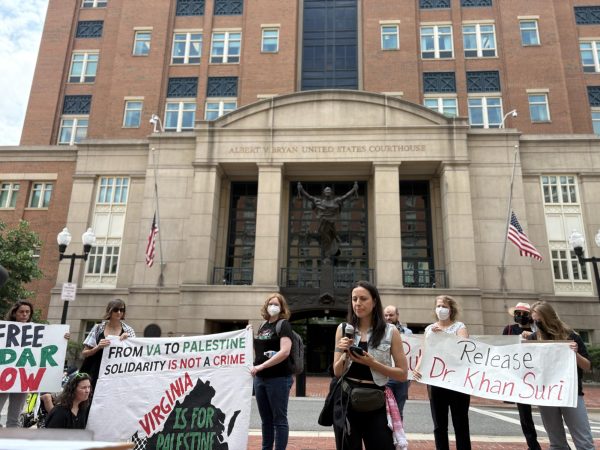
Khan Suri’s counsel argued that since they did not know his location when filing the initial habeas corpus petition, the lawyers correctly filed it in Virginia.
Vishal Agraharkar, a lawyer from the legal nonprofit American Civil Liberties Union (ACLU) representing Khan Suri, said the ACLU believes the government intentionally withheld information from Khan Suri, his family and legal counsel regarding his transfers in order to move him and his case to Texas.
“The government took prohibitive steps to keep him and his counsel in the dark,” Agraharkar said during the hearing.
In an April 21 filing, DOJ lawyers argued the government was not forum shopping, citing concerns of overcrowding in detention facilities in Virginia as grounds for sending Khan Suri’s case to Texas. The lawyers also claimed Khan Suri’s lawyers knew of the change in his detention location.
In the hearing, Tolliver Giles questioned why immigration officials transferred Khan Suri from the Farmville, Va., facility — where they kept him in an individual holding cell — to the Texas facility if potential for overcrowding in Virginia facilities concerned immigration officials.
Khan Suri wrote in an April 15 court filing that his unit in the Prairieland Detention Center, the Texas facility where he is detained, is above maximum occupancy.
“At Prairieland Detention Center, I was not given a bed to sleep in, despite requesting one repeatedly, for almost two weeks,” Khan Suri wrote. “Instead, I slept on the floor in a room with a television blaring at all hours except between 2 a.m. and 5 a.m.”
“I understand this is because of capacity problems in the Prairieland Detention Center,” Khan Suri added. “The capacity of my current dorm is 36, but there are constantly more than 50 people here. There are always about 15 or more people sleeping on the floors because there aren’t enough beds.”
Tolliver Giles requested the DOJ’s lawyers submit additional information regarding the normal length of detention and the number of beds available at Farmville at the time of Khan Suri’s transfer by May 2, allowing Khan Suri’s lawyers to respond May 3 before she rules on the motion. Tolliver Giles did not hear motions to return or release Khan Suri on bond, saying her ruling on jurisdiction should come first.
Tolliver Giles asked David Byerley, an attorney for the DOJ, to answer specific questions about the normal length of a detention and the number of beds available at Farmville to determine if the government is forum shopping.
Mapheze Saleh (GRD ’26), Khan Suri’s wife, attended the hearing. Representative Don Beyer (D-Va.), whose district includes Khan Suri’s place of residence in Alexandria, Va., also attended.
Saleh, who is Palestinian American, said in a press conference held after the hearing adjourned that the federal government detained Khan Suri, separating him from his family, for standing up for his beliefs and for marrying a Palestinian.
“He’s now locked up in Texas, 1,500 miles away from us,” Saleh said at the press conference. “Why is this happening to him? Why is the Trump administration persecuting him? Because he fell in love and married a Palestinian. Because he dared to express his belief in nonviolence and because he spoke out bravley against the genocide of my people in Gaza.”
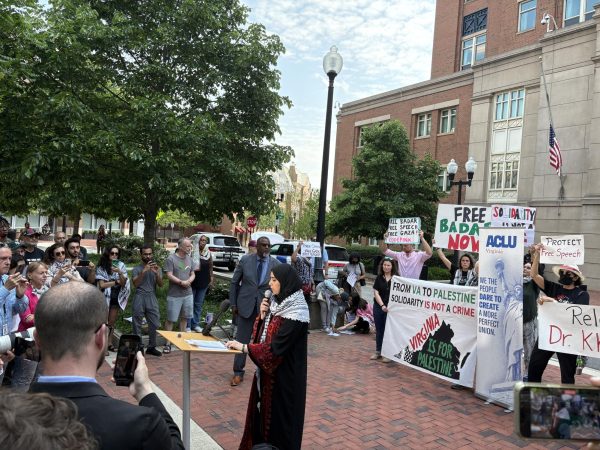
Hassan Minhaj Ahmed, one of Khan Suri’s lawyers, said at the press conference that Khan Suri’s detention reflects a broader pattern of detaining academics and students for their speech.
“We need to understand that we are a country that has political prisoners,” Minhaj Ahmed said. “We do that now, and we need to understand, and all of us need to stand together and fight against this tyranny.”
“We need to stand up against this and say that this is not the America we want to live in,” Minhaj Ahmed added.
The government detained Mahmoud Khalil, a U.S. permanent resident who was a prominent activist during last spring’s pro-Palestine student protests at Columbia University, March 8. Khalil’s lawyers are challenging his detention while he also appeals a deportation order. Federal immigration officials also detained Rumeysa Ozturk, a graduate student at Tufts University, on March 25.
A federal court ordered immigration officials to release Mohsen Mahdawi, a U.S. permanent resident who organized pro-Palestinian student protests at Columbia, on April 30 after ICE detained him for more than two weeks on accusations of threatening U.S. foreign policy interests under the Immigration and Nationality Act, the same law used to detain Khan Suri.
Nader Hashemi, the director of ACMCU, attended the hearing weeks after visiting Khan Suri at the Texas facility. Hashemi said the legal proceedings in Khan Suri’s detainment test democratic norms throughout the United States.
“This is a story that matters not only for Badar Khan Suri, for people at Georgetown, but also it’s a much bigger story than one individual,” Hashemi told The Hoya. “It has to do with the future of democracy in the United States, the very real problem of an existing authoritarian transition that is taking place as we speak.”
Hashemi said it was important for Georgetown students to attend the hearing and rally outside the courthouse, adding that the widespread advocacy reflects the community’s worries for the future.
“Having Georgetown students there sent a really good message that Georgetown students are very much engaged with the big, important political debates that are shaping the future of this country and our world,” Hashemi said.
Saleh said people in the United States should protest the detentions of academics and students because it violates constitutional freedoms.
“I urge Americans and everyone watching us to speak out against these unlawful attacks on the most basic of freedoms,” Saleh said. “I still believe in the principles this country was built on, that speech and beliefs are protected and must not be punished.”
“I call on you in the name of justice to prove that the United States still stands for their promises and values, the same values that are broadcast across the world, but it is failing to uphold right here,” Saleh added.














